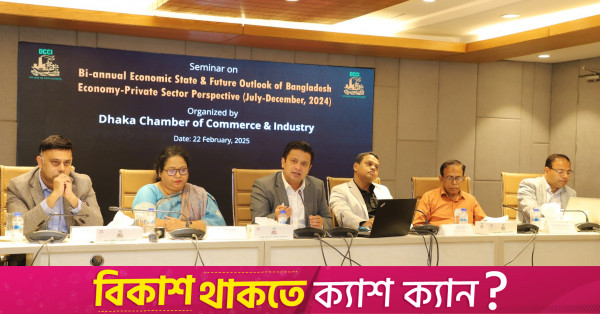Business leaders and economists have emphasised the need for uninterrupted energy supply, double-digit private sector credit growth, labour stability in industries and consistent policy support for creating a business- and investment-friendly environment in the country.
“We are still facing the gas-electricity crisis, and the government must take serious steps to resolve it,” said Taskeen Ahmed, president of Dhaka Chamber of Commerce and Industry (DCCI), at a seminar today.
He said, “Recently, a proposal was made to increase the price of gas by 100%. If it happens, almost every gas-dependent industrial enterprise, such as steel, cement, and Active Pharmaceutical Ingredient (API) manufacturers, will be forced to shut down.”
To restore entrepreneurs’ confidence, we must increase private credit flow to double digits, enhance surveillance to reduce bad loans, ensure good governance and transparency in the financial sector, and lower rates on loans.
Taskeen Ahmed, President, DCCI
The DCCI organised the event titled “Bi-annual Economic State and Future Outlook of Bangladesh Economy – Private Sector Perspective,” at its Motijheel office.
“Private sector credit growth is in an alarming situation,” Taskeen said, pointing out that the growth has sharply declined from 9.8% in June 2024 to just 7.3% by December.
“To restore entrepreneurs’ confidence, we must increase private credit flow to double digits, enhance surveillance to reduce bad loans, ensure good governance and transparency in the financial sector, and lower rates on loans,” said the DCCI president.
Highlighting the current state and challenges of private investment and FDI, Taskeen said factors such as the rising exchange rate, weakened consumer purchasing power, increasing interest rates, political uncertainty, and the energy crisis have discouraged private investment since early 2022.
He also pointed out that net foreign direct investment (FDI) has hit a six-year low year-on-year in the first three months of FY25.
Taskeen highlighted several recommendations to boost investment, including: improving the business environment, aligning investment policies, introducing an FDI policy, and ensuring smooth industrial operations with energy supply.
M Masrur Reaz, CEO of Policy Exchange Bangladesh, said that the forex reserve crisis and import restrictions on raw materials and capital machinery have led to supply-side shortages, which negatively impacted the overall economy and contributed to rising inflation.
However, once reserves reach $25-27 billion within the current fiscal year, improvements in imports for the industrial sector and the supply side are expected, he said.
Reaz also expressed high hopes that, if uninterrupted energy supply to industries is ensured with no major labour unrest, exports could increase by $5-7 billion this year, which would also have a positive impact on the reserves.
Mohammad Yunus, research director at BIDS, highlighted the significant potential of exporting pharmaceuticals, leather goods, and jute products.
He emphasised the need to focus on exporting finished products made from local raw materials, questioning why raw jute should be exported when the country can manufacture and export jute-based products.
Md Abdur Rahim Khan, additional secretary (head of Export Wing) at the Ministry of Commerce, speaking as the chief guest, pointed out the challenges in accessing SME loans, noting that many entrepreneurs find it difficult to obtain financing.
Additionally, he said that the logistics policy has not been fully implemented, and once it is, it could significantly reduce the cost of exporting products.
Abdur said the light engineering industry can be a potential game-changer for the economy. The commerce ministry has taken an initiative to establish a Technology Centre in Gazipur to build capacity and support entrepreneurs in the light engineering sector.
He further suggested that increasing revenue generation and attracting export-oriented FDI could help close the investment gap.
Additionally, he emphasised the importance of improving export competitiveness to address the challenges posed by LDC graduation.
Mohammad Abu Eusuf, professor at the Department of Development Studies, University of Dhaka, stressed the importance of coordinating the budget, monetary policy, and market mechanisms to control inflation.
He said that automating the existing VAT system is essential to increase revenue collection. While poverty is decreasing, he pointed out that inequality in society is increasing.
Eusuf also called for increasing the tax-GDP ratio in Bangladesh, which remains low compared to other countries in the region.
Sayera Younus, executive director of Bangladesh Bank (Research), mentioned that inflation has not yet decreased to the desired level, largely due to higher import costs resulting from the high exchange rate.
However, she expressed hope that inflation will fall below 7% by 2026. She also forecasted an increase in credit flow to the private sector, aiming for double-digit growth by next year.
The Bangladesh Bank is closely monitoring the exchange rate, which is now relatively stable, she said, adding that the overall economic outlook is positive and the future looks bright.


